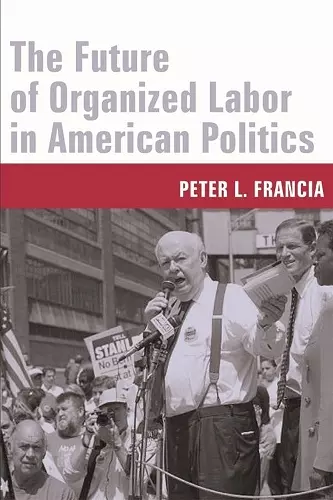The Future of Organized Labor in American Politics
Format:Hardback
Publisher:Columbia University Press
Published:3rd Mar '06
Currently unavailable, and unfortunately no date known when it will be back

In a masterful analysis, Peter Francia answers one of the major puzzles of American labor union politics: the difference organized labor makes in elections. He demonstrates that the AFL-CIO under John Sweeney has used labor's money and people to far greater effect than his predecessors did. By intervening in competitive elections and lobbying forcefully, the AFL-CIO has exercised political influence. Nonetheless, despite increases in spending and mobilization, organized labor is no longer Big Labor, exercising countervailing power against Big Business. Francia offers useful suggestions about how to stem the decline in union density and, therefore, political clout. His words should be heeded and his suggestions addressed by all of us keen to ensure a fully democratic polity. -- Margaret Levi, University of Washington, author of Consent, Dissent, Patriotism Peter Francia has written a fine book that offers a comprehensive account of organized labor's role in congressional politics. The book combines rigorous statistical analysis with an insider's eye to politics, and the result is a book that is both important and accessible. Highly recommended for scholars and students of labor politics, interest groups, and congressional elections. -- Clyde Wilcox, Georgetown University, coauthor of Onward Christian Soldiers: The Religious Right in American Politics
Analyzes organized labor's political activities, its coalitions with other interest groups, and its influence on voter turnout, election results, and votes in Congress. This book examines the effects of Sweeney's embrace of progressive causes and labor's increasing willingness to challenge Democrats who vote against labor's interests.In 1995, promising a more active political presence for unions, John Sweeney was elected president of the AFL-CIO. Labor would develop a "new voice," one that could not be ignored or taken for granted by Democratic and Republican politicians. However, by the summer of 2005 opposition to Sweeney's leadership threatened to divide the labor movement. In The Future of Organized Labor in American Politics, Peter L. Francia discusses the effects of Sweeney's controversial tenure as president and assesses labor's influence on American political elections and legislation. Drawing on interviews with union and business leaders, as well as campaign-finance and public-opinion data, Francia argues that Sweeney has employed a more effective and expansive grassroots political operation than his predecessors. He challenges critics who dismiss Sweeney's efforts as a failure but cautions that the decline in union membership presents a serious crisis for the labor movement. When unions emphasize "grassroots" strategies they can effectively compete against the financial power of big business and can make a significant difference in congressional politics. Francia analyzes organized labor's political activities, its coalitions with other interest groups, and its influence on voter turnout, election results, and votes in Congress. He also examines the effects of Sweeney's embrace of progressive causes and labor's increasing willingness to challenge Democrats who vote against labor's interests. For all his successes, Sweeney's tenure has not been without its problems. Labor's presence in American politics is threatened by shrinking membership in unions. Francia suggests that if unions want to remain a viable political force in congressional politics, they must devote more resources to organizing workers.
A must read. -- Marick F. Masters Journal of Labor Research Francia's book should be read by all. -- Gerald Friedman Labor History
ISBN: 9780231130707
Dimensions: unknown
Weight: unknown
224 pages